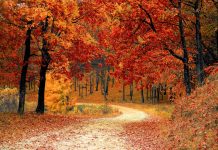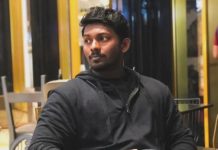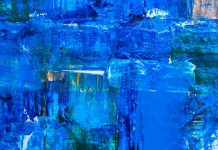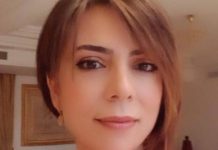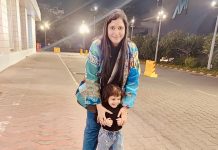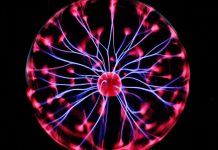Translated from Malayalam by the Poet
Sculpting
A sculptor’s chisel
carves an image in the breeze
that carries the scent of wildflowers.
A boatman’s paddle, dark as night,
carves a sculpture with
the river’s ripples.
The trained hand of an airman
carves a sculpture
in the cloud-wrapped sky
And I go on carving
an endless sculpture with
the sharp edge of my quill.
It slips away from the
paper’s smoothness.
My fingers tremble as if
I am sculpting in Time
that never stands still.
History
History was there before us;
only, we were not there:
we, who believe we are witnesses to
the objects, plants, and beasts on earth,
why, that they were all
created for us, even.
But they don’t think so.
They were the witnesses to our emergence.
They blessed us,
gave us water and shade,
flowers, fruits, milk.
In the beginning we feared them,
and worshipped; then we
ousted them from history,
turned us into our slaves and menials.
Have you ever had to watch your brothers
being axed and sawn into pieces
to be sold in the timber market?
or hanging on a hook, bleeding,
in the meat shop?
Our tribe doesn’t have much time left.
Our own inventions will
render us irrelevant.
Those who saw our rise
will, in total detachment
watch our fall.
They will survive,
to write a new history where
the tale of our arrival and departure
will be told in just a paragraph,
scribbled on brown rocks and green leaves,
by the liquid fingers of the rain
falling from the sapphire clouds,
in the secret language of the leaf -veins
and the tortoise-shell:
the minute history of the universe
caught by their own meticulous antennae,
where only they will feature,
and their God.
Skulls
Do not burn me on a pyre;
Bury me in the earth instead.
After a thousand years,
If mankind still survives,
Let a Hamlet hold my skull
And speak to his Horatio about its lips,
Now just teeth , that had once
Made people laugh with jokes,
About Alexander and Caesar who
Turned into clay to plug holes.
Or let him speak to Ophelia’s ghost
With its wet hair about the unfamiliar voyages
Of the brain it had held,
Its fantasies and anxieties,
Memory and forgetting ,
The strange language of imagination
That grew on it like a tumour.
Let him plant it in the soil
That grows flowers and keep watering it.
Let a tree of skulls grow from it,
Many trees, maybe,
A whole huge forest,
Whose flowers are the skulls of
Plato and Patanjali,
Hegel and Sartre,
All wan and weary with thought.
A boy will come to break them
Like pitchers of curd, saying,
in a burst of laughter that
Philosophers have only interpreted the world,
Though no one is sure
Even he will change the world
The Nation of Birds
The nation of birds has no borders,
Nor a constitution.
All those who fly are its citizens,
Including poets.
Its flag is the wing.
Have you ever heard a cuckoo
Quarrel with a nightingale over their song?
Or a crane driving a crow away
For its colour?
If the owl hoots, it is not because
It is jealous of the parrot.
Has an ostrich or a penguin
Ever complained they can’t fly?
They begin chatting with the sky
As soon as they are born.
Clouds and rainbows descend
To stroke them; at times they lend
Their hues to the birds,
Like the cloud to the doves
Or the rainbow to the peacock.
They dream seated between
The sun and the moon. Then the sky
Fills with angels and stars.
They can see even in the dark,
Chat with elves and fairies.
They come down to earth to
Comfort the grass or to open
The flowers with their song.
The fruits and worms they eat
Burst out of their eggs with tiny wings.
One day I tried living as a bird.
I lost my nationality.
Nation is a cage. It feeds you
First for your song and when
It begins to dislike your song,
For your meat.
Salt
Ninety years ago,
we extracted from the sweat of
the ocean’s ceaseless waves,
a handful of salt:
a blossom of tender white
in a lean raised hand.
One hand suddenly turned into
six thousand manacled ones :
millions of fists raised against
an empire ‘where the sun never set’.
From that day truth in our land
came to be called ‘ imprisoned salt.’
Ram, Allah, Khuda, Messiah:
that salt was everything to us:
the prophetess who emerged from
the seafoam and arrived in the kitchen,
the white-winged angel,
the eternal saviour of our dreams.
A handful of liberty,
a handful of equality,
a handful of love,
a handful of kindness,
a Buddha of salt.
Today once again we raise
a flag of white salt
in the background of
the ocean’s dark turquoise blue:
the fleeting vision of
dark-haired freedom
slipping off from our little hands,
the snowy elaboration of fair equality
that we still keen our ears for,
a calloused hand with the scent of sweat
our flesh and tears have,
a handful of the dark-edged salt of justice
studded with the sand grains of rebellion
that Gandhi had raised in Dandi
ninety years ago.
Between Seventy and Seventy-Five
There is a dark place between
Seventy and seventy-five: broad
Like memory, deep like death.
Those trapped there have no return.
They roam about in the childhood bushes
Or fall headlong into the well of decrepitude.
Be warned if those between seventy and seventy-five
Behave like the young: for, they are young.
They can love, can dance to music, and if need be
Even lead a war or a revolution. In fact
They are not dead like most young are.
Those between seventy and seventy-five
May suffer from delusions: at times they want
A horse-ride; at times want to fly above oceans and mountains
On the back of an eagle, wander along deserts
Looking for water that is not there, stand naked
In the rain, or read a poem no one has written yet. There
Are times when they feel history is retracing its step,
And feel like crying aloud, screaming, almost.
The solitude of those between seventy and seventy-five
Is sepia, like some early morning dreams or
Like the friendships in old albums. When they
Laugh, sunlight retreats into village lanes.
Their sweat smells soft like sesame flowers.
Their walk is like the descending scale of saveri (1)
And their lilting speech is littered with gamakas (2)
You wonder, why, this is all about men. Yes,
Women do not pass at all between
Seventy and seventy-five; invisible to us,
They just glide along on a tender rainbow of affection,
With the soft feet of fairies fragrant like heaven
And the smile of oleanders, an invitation to salvation.
(1) Saveri : A raga in Karnatic music
(2) Gamakas: embellishments done on a musical note
About the Author
K Satchidanandan (b.1946) is a bilingual poet, critic, playwright, editor, fiction writer, and travel writer. He has thirty collections of poetry in Malayalam, nine in English, and thirty-three collections in other languages including Arabic, Irish, French, German, Italian, Spanish, Chinese, and Japanese besides all major Indian languages. He has won fifty-two literary awards – including the National Academy award, Dante Medal from Italy, Poet Laureate Award from Tata Literature Festival, Bombay, five awards in five genres from Kerala Sahitya Akademi besides the topmost awards for poetry and total literary contribution from Kerala, Karnataka, Andhra Pradesh, Orissa, and Maharashtra. He has read his poetry and lectured at several festivals and book fairs in over thirty countries in six continents. His latest books of poetry in English include While I Write (Harper-Collins), Misplaced Objects and Other Poems (Indian National Academy), The Missing Rib, Not Only the Oceans (Poetrywala, Bombay), The Whispering Tree, No Borders for Me (both Hawakal, Calcutta) and Singing in the Dark ( ed. with Nishi Chawla, Penguin-Random House, India). His selected essays on Indian literature, Positions was published by Niyogi Books, Delhi in 2020 and a collection of resistance writing, Words Matter edited and introduced by him came out from Penguin Random House in 2018. Satchidanandan lives with his family in Delhi.



